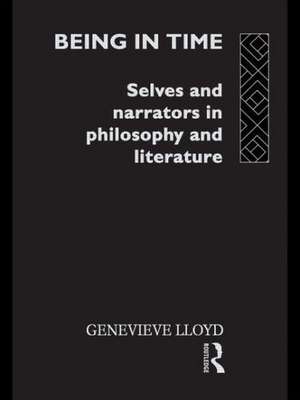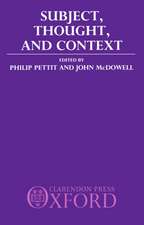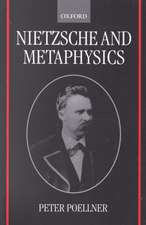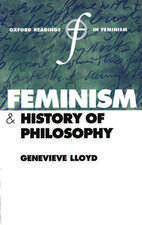Being in Time: Selves and Narrators in Philosophy and Literature: Ideas
Autor Genevieve Lloyden Limba Engleză Paperback – 2 sep 1993
| Toate formatele și edițiile | Preț | Express |
|---|---|---|
| Paperback (1) | 382.65 lei 6-8 săpt. | |
| Taylor & Francis – 2 sep 1993 | 382.65 lei 6-8 săpt. | |
| Hardback (1) | 1161.28 lei 6-8 săpt. | |
| Taylor & Francis – 2 sep 1993 | 1161.28 lei 6-8 săpt. |
Preț: 382.65 lei
Nou
Puncte Express: 574
Preț estimativ în valută:
73.22€ • 75.65$ • 60.91£
73.22€ • 75.65$ • 60.91£
Carte tipărită la comandă
Livrare economică 19 martie-02 aprilie
Preluare comenzi: 021 569.72.76
Specificații
ISBN-13: 9780415071963
ISBN-10: 0415071968
Pagini: 202
Dimensiuni: 138 x 216 x 12 mm
Greutate: 0.29 kg
Ediția:New.
Editura: Taylor & Francis
Colecția Routledge
Seria Ideas
Locul publicării:Oxford, United Kingdom
ISBN-10: 0415071968
Pagini: 202
Dimensiuni: 138 x 216 x 12 mm
Greutate: 0.29 kg
Ediția:New.
Editura: Taylor & Francis
Colecția Routledge
Seria Ideas
Locul publicării:Oxford, United Kingdom
Cuprins
Introduction 1 Augustine and the ‘problem’ of time; 2 The self: unity and fragmentation; Descartes: the unity of thinking substance; Hume’s labyrinth and the painting of modern life; Kant: the unity of apperception 3 The past: loss or eternal return? Bergson: time and loss; Nietzsche: ‘ill will towards time’ 4 Life and literature; Proust: ‘life realized within the confines of a book’; Virginia Woolf: moments of being. Conclusion: philosophy and literature
Notă biografică
Genevieve Lloyd is Professor of Philosophy at the University of New South Wales in Sydney, and author of The Man of Reason: ‘Male’ and ‘Female’ in Western Philosophy (London, Routledge, 1984). She has published papers on the metaphysics of time, on the history of philosophy, philosophy and literature, and philosophical aspects of gender.
Descriere
Lloyd's book is a provocative essay on the fragmen tation of the self as explored in philosophy and literature. The past is irrevocable, conscious ness changes as time passes: given this can there ever be such a thing as the unity of the self?



















